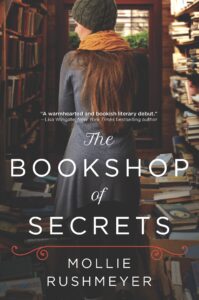By Mollie Joy Rushmeyer, @mollierushmeyer

As writers, we probably all wish there was a magical idea fairy who could tap us with her wand, and Bam! A best-selling novel idea is zapped into our brains, laid out, and plotted for us.
I’ve occasionally had an idea for a story pop into my head—always and inevitably while I’m in the shower, soap in my eyes, or while driving a long distance—but most of the time, I must go out and search for my inspiration. Or, at the very least, research, read, and let my mind wander often enough to stumble upon a great idea spark.
Sometimes in the world of writing and so many stories already in existence, it can feel like everything has been done. But we each have a unique viewpoint and voice, and can work at tweaking a story idea until it’s ours alone.
So, where can we find these elusive plot/character/dark moment backstory/et cetera ideas?
- Online/print news sources: I know, we have to be careful with this one. Everything available to read/see isn’t always good for our souls. Try to find local news sources you trust and look for the human interest section. There are still heart-warming, feel-good stories about people and places.
- History books or blogs: Even if you don’t write historicals, you might find the interesting life story of a person can serve as the inspiration for your contemporary story. For me, I do write modern-day fiction but it always has a thread of history woven throughout. The idea for Lake Superior pirates (a small plotline in The Bookshop of Secrets) came from reading Minnesota history articles.
- YouTube vlogs/documentaries: YouTube is a great place to find all kinds of writing information. For example, I used full episodes from the Time Team and DigVentures (both are archaeological groups) extensively during the writing of my last two books.
- Museums: Whether it’s a history museum, an art museum, or a museum dedicated to something specific like coal mining or the making of shoes, there are stories here. That’s what a museum is—a story brought to life through displays, objects, personal accounts, pictures, textiles, et cetera.

- Observing people: This may sound simple and at the same time a tad on the creeper side. But this is watching and listening, not stocking! I learn so much from sitting at a park or a coffee shop, anywhere out and about. I see how people interact, their mannerisms, how they dress, and hear the occasional juicy tidbit from a public cell phone conversation. I’ve found some of my favorite character quirks from these observations.
- Family history/stories: This could be from your own family or someone else’s, with their permission. I used my own family history to write a book set in Scotland and it was so fulfilling and fun to share that piece of our heritage. If you want to grant privacy, make sure to change names, places, and identifying details.
- Watch movies and read widely: I know, tough homework, right? If you’re not writing and instead reading, your excuse can always be, “I’m researching.” We’re not consuming the stories of others to copy ideas. We do so to jumpstart our own. Have you ever watched a movie or read a book and thought, “I wonder what would’ve happened if the character had done ____ instead?” Or maybe you love one particular detail of a movie or book that you can then dissect away from its source material and spin it into something completely different.
- Ask what if?: This relies more upon your own creativity. This is a chance to let your imagination loose. Ask yourself, “What if I wrote a story about…?” I would recommend doing this one while taking a quiet walk by yourself. There is some science behind our brains working to solve problems while our legs are moving. Perhaps take your phone with and voice text or create a voice note to yourself as you talk out your ideas. If you’re like me, telling yourself you’ll remember your ideas later, won’t work!
- Brainstorm with writing friends: I can’t stress enough how much this one has been a lifesaver for me. Having a sounding board and people who can lend a different perspective is a game-changer. I brainstorm every single book idea with writing friends.
- Your own life: I think we need to be careful about what we share and our intentions behind it. But something you learned in your own life, something you struggled with and overcame, the joyful or funny things that have happened to you, can all be the catalyst for a fictional story. You’re the keeper of those stories and only you can decide if/when/how much you’ll share. “Write what you know” sometimes comes from our own life experiences and can be a truly powerful tool in our storytelling.
Go forth and write those beautiful stories brewing in your hearts!
A collection of lost books holds the clues to her family’s legacy…and her future.
Hope Sparrow has mastered the art of outrunning her tragic past, learning never to stay anywhere too long and never to allow anyone control over her life again. Coming to Wanishin Falls in search of her family’s history already feels too risky. But somewhere in the towering stacks of this dusty old bookshop are the books that hold Hope’s last ties to her late mother—and to a rumored family treasure that could help her start over.
Only, the bookshop is in shambles, and the elderly owner is in the beginning stages of dementia and can’t remember where the books lie. To find the last links to the loved ones she’s lost, Hope must stay and accept help from the townsfolk to locate the treasured volumes. Each secret she uncovers brings her closer to understanding where she came from. But the longer she stays in the quaint town, the more people find their way into the cracks in her heart. And letting them in may be the greatest risk of all…

Mollie Joy Rushmeyer writes “Contemporary Fiction with a Heart for History.” She loves to write inspirational fiction in contemporary settings with fascinating historical elements, people, objects, and stories woven throughout. A modern girl herself, she wouldn’t want to go a day without modern plumbing. But she’s always felt a special connection to the past. The legacies and lives left behind are like gifts waiting to be unwrapped, and she shares this blend of history and contemporary living with readers.
A born and bred Midwestern gal, Mollie, makes her home in Minnesota with her husband and two spunky daughters. She is not only a bibliophile (the dustier the better, in her opinion), she’s a true anglophile at heart. Tea and coffee fuel her travels, by Google maps at least, and her passion for the written word.
Her debut novel, The Bookshop of Secrets, with Love Inspired Trade/Harlequin released October 25th, 2022. And her second, The Lost Manuscript, will be available August of 2023.
She’d love to connect through social media: https://www.facebook.com/mollie.rushmeyer and https://www.instagram.com/molliejoyrushmeyer/
And don’t forget to sign up for her newsletter (visit www.molliejrushmeyer.com) for vintage recipe reboots, history mixed with modern living, tea and book pairings, exclusive giveaways, and a FREEBIE pdf download “10 Vintage Hacks for Modern Homes.”

